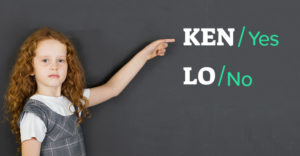We feel your pain, picturing yourself in the middle of a country where you don’t understand a word of what people are saying must be difficult. Most likely, you already know “Shalom”, and maybe “Bevakasha”, but we want to take this opportunity to provide you with a basic survival guide.
Here’s a list of words you need to know before stepping a foot in the Holy Land. We guarantee that these terms are going to make your life much easier whether you are picking someone up at the local bar, or negotiating the price of the lovely “Hamsa” you want to hang next to your front door back home.
These are the Hebrew words you’ll need to learn in order to have a fun, easy and successful visit to Israel
Leaving the chaos and calling for patience
Let’s start with an important one – something you shouldn’t only learn, something you should start applying from the very moment you board the white and blue airplane. This is a word that will guide you throughout your entire time in the land of milk and honey. No, we’re not talking about “falafel” (which is actually, an Arabic word at its roots)… We’re talking about “Savlanut” (Pronounced sav-lah-noot).
Savlanut means “patience”, and it can even be used for “be patient” when you accompany the word with a not-so-friendly gesture with your hand.

Everything is going to be OK, just ask for a little “savlanut”, and we’re sure your experience in Israel will be more enjoyable and pleasant.
An optimistic point of view: Everything is going to be alright!
If there’s something you have to recognize about Israelis it is their eternally optimistic mood. It doesn’t matter that several dozen rockets fall in our country once in a while, it doesn’t matter that supermarkets are crazy expensive, or that it is really hard to buy a house in Israel. The answer will always be the same: HaKol BeSeder.
Indeed, the typical Israeli answer to whatever problem you might have is that “everything is going to be OK”. No, don’t get confused, we’re not in Woodstock or in the middle of a Ho’oponopono meditation in Hawaii.

Israelis are optimistic by nature. It can be for many different reasons, but they are. So whenever you see yourself in the middle of a discussion, problem or a sad moment, just close your eyes, picture yourself at the Western Wall or in the middle of Haifa’s promenade and remember: HaKol BeSeder.
Fun fact: HaKol BeSeder can also be used for “no problem”. So “HaKol Beseder” if you want to use it for that too.
Get the right price and negotiate everything: Asking for a discount!
Let’s not exaggerate, many people think that they can enter a fancy restaurant on Rothschild Boulevard and bargain (please, don’t be one of those). But indeed, there are some places in Israel where you can apply everything you learned while watching Fauda or Ramzor and let the cheap spirit come out for a while.

But wait, how will you ask for a discount if you don’t know how to even say the magic word (and this time, the magic words aren’t please nor thank you). Discount is “Hanacha” (pronounced ha-nah-chá), and you can practice the usage of this word in any of the markets, and in some souvenir stores. Don’t worry, if the salesman gets angry, you can always say “Savlanut, haKol BeSeder”. Are you getting it already?
Realistic note: Don’t be mad at this, but even if you walk away from the stand or store happy with your discount… they won! Just assume this, take a deep breath, and be happy!
Subscribe to our newsletter
Learn Hebrew slang, take a virtual tour across Israel, discover the best local food and so much more
The basics: How to reject or accept a proposal from an Israeli. The Hebrew for Yes and No.
If you were thinking that in this article you were going to learn how to ask where’s the bathroom, you were wrong. In almost every article you can learn that simply by asking “eifo hasherutim” you can get easy directions to go pee in peace.
In this part of the article, we want to teach you to say yes and no in Hebrew. As simple as that. Yes, is Ken (10 gold points for whoever remembers who Ken Adams was), and No is “Lo” (pronounced Loh). Now, you’re more than ready to go out and either reject or accept one of the several proposals you’re going to receive from Israelis. From business to marriage, now it’s up to you to say ken or lo. Of course, there are many more words to be taught, why not start with our Modern Hebrew course for beginners?

Don’t worry, whatever happens, and whatever you decide… HaKol Beseder.














[…] how do you say snow in Hebrew? We have gone over several terms and words, but do you know how to refer to the main asset of Elsa’s kingdom? Snow is שלג, and it is […]
[…] These innovations are changing the world, and we’re sure you could meet some of these founders in your next visit to Israel, at the end of the day, we all live in a small country… but wait, you don’t want them to realize your Hebrew is a bit broken. Why don’t you take an online Hebrew course to prepare yourself for this, and other, potential meetings? Eh? Does it sound like a good idea? Don’t be stressed, haKol yihie beSeder! […]